
Philosophy of Music Education Review
Scope & Guideline
Cultivating Scholarly Perspectives on Music Education
Introduction
Aims and Scopes
- Philosophical Foundations:
The journal emphasizes the exploration of philosophical concepts related to music education, drawing from classical thinkers like Aristotle, Kant, and Augustine to inform contemporary practices. - Social Justice and Inclusion:
There is a strong focus on themes of social justice, diversity, and inclusion in music education, examining how music can serve as a medium for advocating equity and social change. - Cultural Perspectives:
The journal often addresses the cultural dimensions of music education, including how different musical traditions and practices can coexist within educational frameworks. - Critical Pedagogy:
A commitment to critical pedagogy is evident, as the journal encourages authors to challenge normative practices and explore innovative approaches to teaching and learning in music. - Interdisciplinary Approaches:
The journal promotes interdisciplinary research that connects music education with other fields such as sociology, psychology, and cultural studies, fostering a holistic understanding of music's role in education.
Trending and Emerging
- Emotional and Experiential Learning:
There is a growing emphasis on reclaiming emotion and personal experience in music education, suggesting a shift towards valuing subjective experiences alongside traditional educational metrics. - Music and Social Change:
A notable trend is the exploration of music as a tool for social change, with increasing attention to how music education can foster activism and community engagement. - Global and Cross-Cultural Perspectives:
The journal is increasingly focusing on global perspectives in music education, examining how international practices and philosophies can inform local educational contexts. - Digital Technology in Music Education:
The integration of digital technology in music education is emerging as a significant theme, highlighting how digital tools can enhance learning experiences and broaden access to music education. - Philosophical Inquiry into Identity and Agency:
Recent articles are exploring concepts of identity and agency within music education, reflecting a trend towards understanding how music education shapes individual and collective identities.
Declining or Waning
- Traditional Music Education Methods:
There seems to be a waning interest in traditional, prescriptive methods of music education, which focus solely on technical skill development without engaging with broader philosophical or social contexts. - Purely Historical Analyses:
Although historical perspectives are still relevant, there is a decline in papers that focus exclusively on historical analyses of music education without connecting to current practices or philosophical implications. - Overly Technical Music Theory:
The journal has seen a decrease in articles that delve deeply into technical music theory without considering its philosophical or pedagogical significance, reflecting a shift towards more holistic educational discussions.
Similar Journals
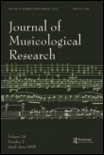
JOURNAL OF MUSICOLOGICAL RESEARCH
Celebrating the Intersection of Music and AcademiaJOURNAL OF MUSICOLOGICAL RESEARCH, published by Taylor & Francis Ltd, is an esteemed platform that delves into the field of musicology, contributing to the ongoing dialogue in music research and scholarship since its establishment in 1979. With an ISSN of 0141-1896 and an E-ISSN of 1547-7304, this journal serves as a vital resource for researchers, professionals, and students, offering insights into diverse musicological topics. Although currently categorized in Q4 in Music with Scopus rankings placing it at #110 out of 180 in the Arts and Humanities field, its commitment to excellence and broader discourses in music studies is evident. The journal does not have Open Access options, yet it provides accessible content through reputable academic channels, fostering scholarly exchanges within the community. It aims to publish high-quality research that advances understanding of musical practices and cultural implications, making it a critical resource for those passionate about music and its myriad influences.

RADICAL PHILOSOPHY
Challenging conventions, redefining thought.RADICAL PHILOSOPHY is a distinguished journal dedicated to the exploration of contemporary philosophical issues, contributing to the fields of philosophy, arts, and social sciences. Published in the United Kingdom, this journal fosters critical discussions and promotes innovative ideas within its diverse scope. Although it is not an open access journal, it remains a vital resource for academics and students seeking to engage with radical thought. With its ISSN 0300-211X and E-ISSN 0030-211X, the journal's presence is firmly established in the scholarly community. It holds notable rankings: Q3 in Arts and Humanities and Philosophy in 2023, indicating its relevance and influence within these domains. Furthermore, with a Scopus rank positioning it in the 69th percentile for philosophy, RADICAL PHILOSOPHY stands as a critical platform for disseminating thought-provoking articles that challenge conventional narratives. Whether you are a researcher, a professional, or a student, this journal provides a significant avenue for inquiry and intellectual exchange, inviting contributions that push the boundaries of philosophical discourse.
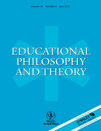
Educational Philosophy and Theory
Cultivating Interdisciplinary Perspectives on EducationEducational Philosophy and Theory, published by Taylor & Francis Ltd, serves as a premier platform for scholarly discourse at the intersection of education, philosophy, and science. With an impressive impact factor reflected by its Q1 categorization in both Education and History and Philosophy of Science, this journal has established itself as a leading voice since its inception in 1969. It is notably ranked 13th in History and Philosophy of Science and 366th in Education according to Scopus, positioning it within the top tiers of academic research. This journal encourages critical discussions, innovative methodologies, and interdisciplinary approaches to educational issues, making it an essential resource for researchers, educators, and students alike who seek to deepen their understanding of the philosophical frameworks that underpin educational practices. Although currently not an Open Access journal, it remains committed to providing high-quality, peer-reviewed content that influences both theoretical and practical aspects of education. Join the dialogue in shaping the future of educational philosophy by exploring the latest research and theories published herein.

European Journal for Philosophy of Religion
Engaging Minds in the Philosophy of ReligionEuropean Journal for Philosophy of Religion is a distinguished platform dedicated to advancing critical discourse in the fields of philosophy and religious studies. Published by the European Journal Philosophy Religion, this journal serves as an essential resource for scholars interested in exploring the intricate relationship between philosophical inquiry and religious thought. With an impressive 2023 Scopus Ranking, positioning it in the 80th percentile for Religious Studies and 69th percentile for Philosophy, the journal reflects a robust academic influence in its fields. This UK-based publication, operating out of the University of Innsbruck's Institute of Christian Philosophy, offers a Q3 category ranking, indicating its significance in ongoing scholarly discussions. Although currently not open access, the European Journal for Philosophy of Religion provides valuable insights and is a critical venue for researchers, professionals, and students who are eager to engage with contemporary philosophical debates surrounding religion.

BULLETIN OF THE COUNCIL FOR RESEARCH IN MUSIC EDUCATION
Shaping the Future of Music Education ResearchBULLETIN OF THE COUNCIL FOR RESEARCH IN MUSIC EDUCATION, published by UNIV ILLINOIS PRESS, is a premier scholarly journal dedicated to advancing the field of music education through rigorous research and critical discourse. With an ISSN of 0010-9894 and E-ISSN 2162-7223, this journal plays a significant role in disseminating innovative findings and educational practices, ranking in Q1 for Music and Q2 for Education as of 2023. The journal's esteemed position is further highlighted by its Scopus ranking, placing it in the 80th percentile among music-related publications. Covering a time span from 2002 to 2024, it serves as a vital resource for educators, researchers, and graduate students alike. Although the journal does not currently offer open access, its contributions remain crucial in shaping music education research and practice. The BULLETIN not only inspires scholarly inquiry but also enhances the discourse surrounding effective music education methodologies.
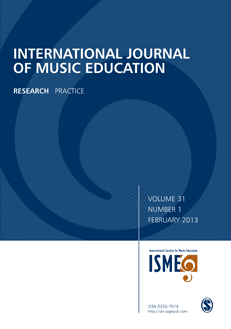
International Journal of Music Education
Connecting educators through the power of music.The International Journal of Music Education is a premier academic platform published by SAGE Publications Ltd, dedicated to exploring the interdisciplinary intersections of music and education. With its ISSN 0255-7614 and E-ISSN 1744-795X, this esteemed journal has been contributing significantly to the field since 1996 and will continue to do so through 2024, underscoring its commitment to advancing scholarly discourse in music pedagogy. It boasts impressive ranking metrics, including Q1 status in Music and Q2 in Education as of 2023, reflecting its influence within these domains. Ranked #10 out of 180 in Music (94th percentile) and #501 out of 1543 in Education (67th percentile) by Scopus, the journal is acknowledged for its rigorous peer-reviewed articles that address contemporary issues, innovative teaching strategies, and the role of music in learning environments. Although it does not offer open access, researchers, professionals, and students are encouraged to engage with its comprehensive research findings, ensuring the advancement of both music education and the broader arts landscape.
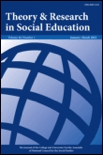
THEORY AND RESEARCH IN SOCIAL EDUCATION
Driving Excellence in Social Education ResearchTHEORY AND RESEARCH IN SOCIAL EDUCATION is a leading academic journal that publishes high-quality research on the intricacies of social education, aiming to bridge theory and practice in the field. Established in 1973 and renowned for its scholarly contributions, this journal is published by Routledge Journals, Taylor & Francis Ltd, offering an esteemed platform for educators, researchers, and policy-makers alike. With an impressive impact factor and ranking in the top quartile (Q1) in both the Education and Sociology and Political Science categories, it provides a highly regarded venue for the latest research and theoretical developments. The journal embraces a diverse scope encompassing critical issues, innovative methodologies, and pedagogical strategies in social education, essential for those seeking to deepen their understanding and influence in the field. Although it does not currently offer open access, the rigorous peer-review process ensures that the content remains of the highest quality. By contributing to this journal, researchers can engage with a wide audience, fostering academic dialogue and practical applications that advance social educational practices.

Resonancias
Innovating Perspectives in Music Studies.Resonancias is a distinguished open-access journal published by the Pontificia Universidad Católica de Chile, dedicated to advancing the field of music studies. With an ISSN of 0717-3474 and an E-ISSN of 0719-5702, this journal has been promoting scholarly discourse in music since its transition to open access in 2014. Resonancias serves as a critical platform for researchers, professionals, and students alike, enabling them to disseminate knowledge and explore innovative perspectives in musicology. With its current Q2 ranking in the field of music as of 2023, and a Scopus ranking of #108 out of 180, this journal exemplifies its commitment to quality and impact within the academic community, fostering an accessible database of music research from Chile and beyond. Situated at AVENIDA VICUNA MACKENNA 4860, MACUL, SANTIAGO, CHILE, Resonancias not only promotes original research but also includes critical reviews, interviews, and essays that contribute to the rich tapestry of musical knowledge.
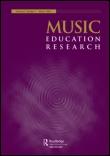
Music Education Research
Shaping the Landscape of Music EducationMusic Education Research is a prestigious journal dedicated to advancing scholarship in the field of music education, published by Routledge Journals, Taylor & Francis Ltd. With a significant impact factor reflected in its Q1 ranking in Music and Q2 in Education for 2023, this journal is a critical resource for researchers, educators, and practitioners alike. It consistently ranks high in both the Arts and Humanities and Social Sciences categories, with an impressive position of Rank #8 in Music out of 180 journals, indicating its influence in shaping contemporary discourse. Aimed at fostering innovation and critical examination within music education, Music Education Research invites submissions that explore a broad spectrum of topics, encompassing pedagogical practices, policy implications, and curriculum development. Operating from the United Kingdom, the journal provides a vital platform for sharing cutting-edge research and is committed to improving music learning experiences across various educational contexts.

Research Studies in Music Education
Innovating Practices for Future Music EducatorsResearch Studies in Music Education is a prestigious peer-reviewed journal published by SAGE Publications Ltd, dedicated to advancing the field of music education through innovative research and critical discourse. With an ISSN of 1321-103X and an E-ISSN of 1834-5530, this journal has been a vital resource for academics since its inception in 1993, and continues to serve as a platform for high-quality scholarship aimed at fostering excellence in music education practices worldwide. The journal's impressive Q1 ranking in Music and Q2 in Education for 2023, along with a Scopus rank of #11 out of 180 in the Arts and Humanities category, underscores its significance and influential presence within the academic community. Although it operates under traditional publishing models, readers can expect to encounter a wealth of knowledge that reflects current trends, methodologies, and insights in the realms of music teaching and learning. The journal not only aims to enrich the discourse in music education but also supports researchers, educators, and students in their endeavors to improve musical understanding and pedagogy.